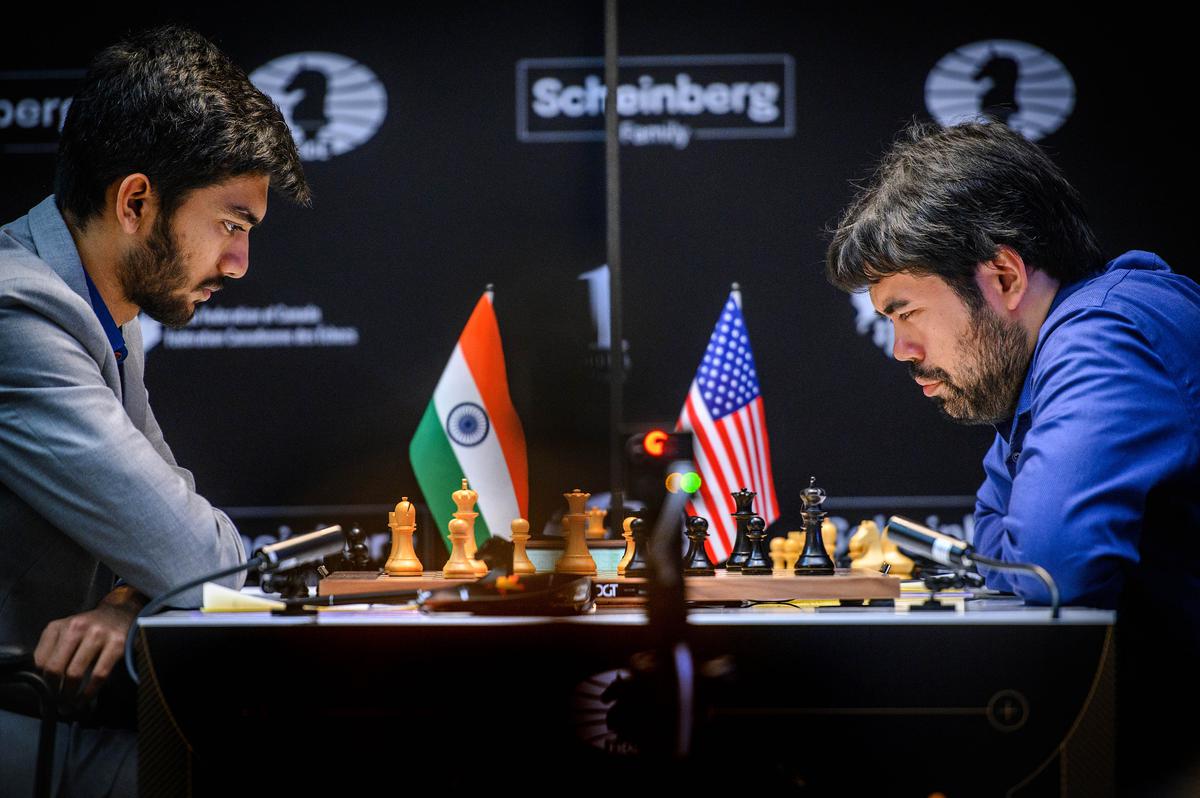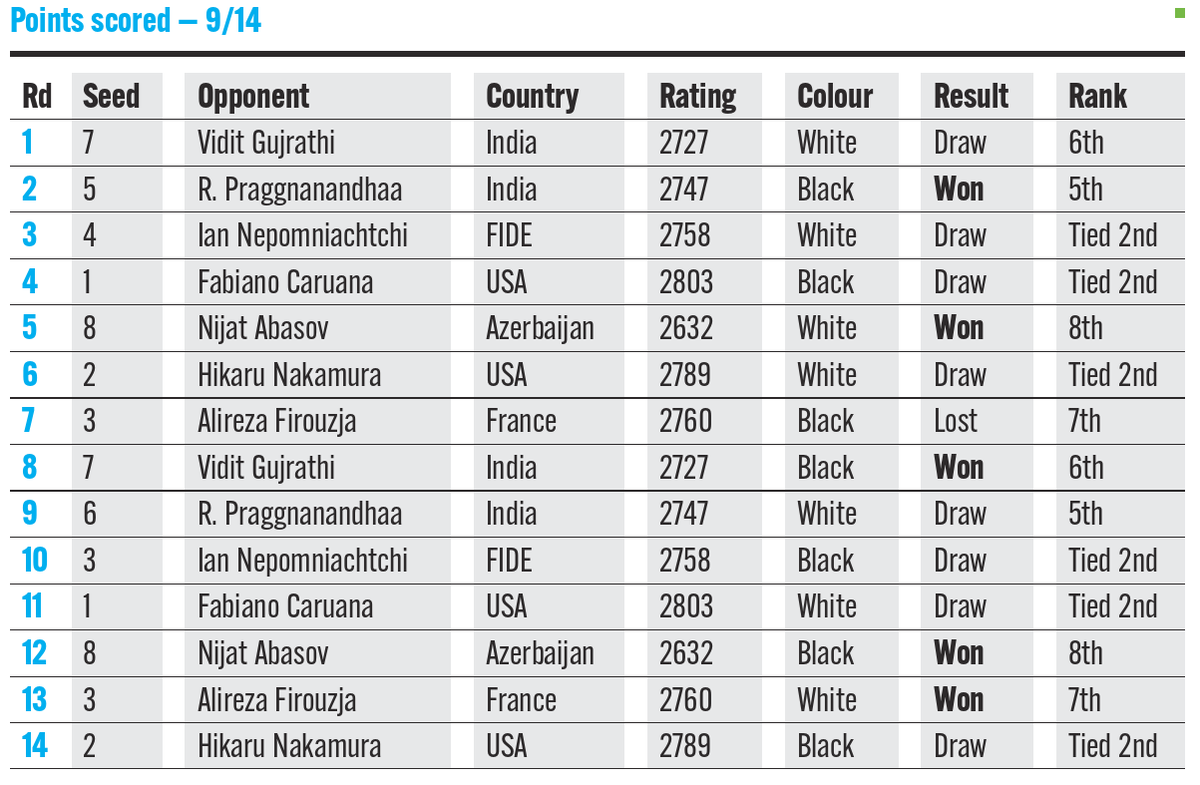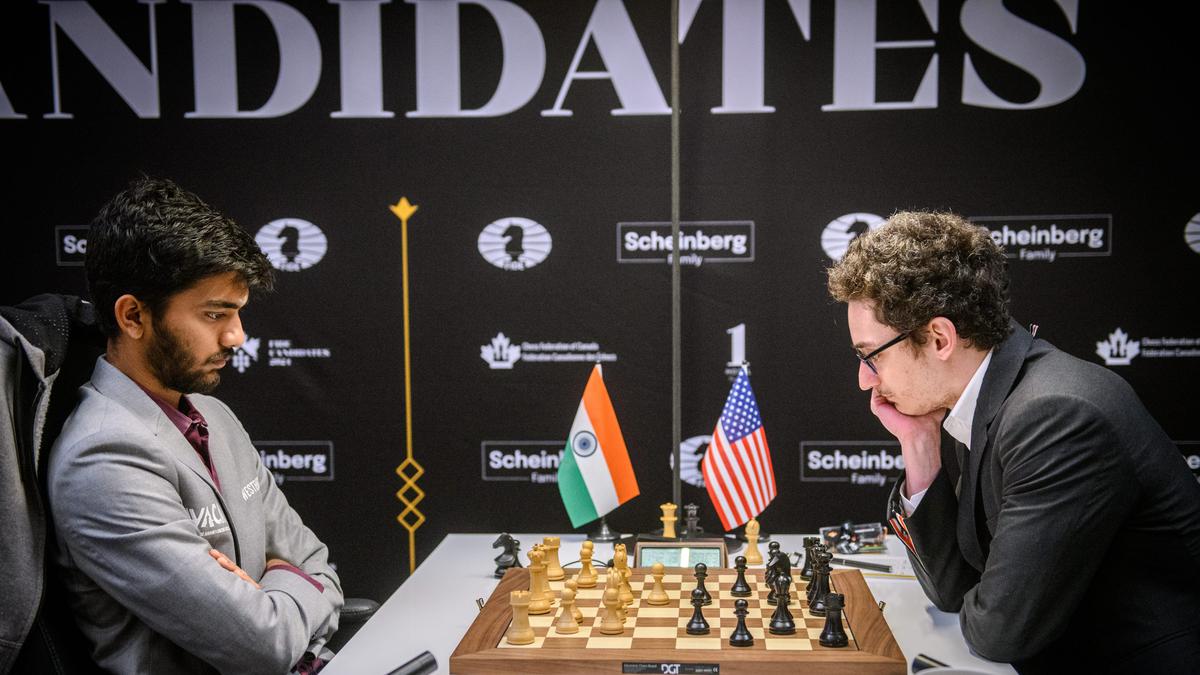How ‘ambitious’ Gukesh won Candidates 2024 and got closer to conquering the world
For more than a decade, Viswanathan Anand remained the world chess champion. In the space of 12 years, Anand won five times and became one of the greatest players to have played the game. Strangely, only a handful of Indians watched Anand in action as he went about collecting world titles in three different formats. Even shooter Abhinav Bindra and cueist Pankaj Advani scaled great heights in their illustrious careers in the absence of live images of their conquests in India.
As a welcome move, in recent years, more and more live broadcasts of sporting disciplines have become available, and chess is one of the biggest gainers. In fact, the COVID-19 pandemic proved a boon for chess since it caught the attention of those confined indoors with access to the internet. As a result, young Indians like R. Praggnanandhaa, D. Gukesh, Arjun Erigaisi, and Nihal Sarin, among a few others, benefitted immensely. The live images, coupled with their consistent performances, have helped grow the chess community. From the 2022 Chess Olympiad to the 2023 World Cup to the FIDE Candidates 2024, some stupendous Indian performances were hailed.
Till the other day, the biggest gainer was World Cup runner-up Praggnanandhaa. Today, notwithstanding the ongoing IPL, Gukesh’s sensational triumph in the Candidates tournament becomes the talking point. Many stayed awake all night to keep track of the final round once it became known that Gukesh had the best chance to win, ahead of three of the top-four players in the world. India woke up to the news of Gukesh, 17, becoming the youngest to win the Candidates and earn the right to challenge the reigning world champion Ding Liren in the world title clash scheduled to begin in late November this year.
The media’s urge to immediately reach out to the champion was understandable. Unlike the days when Anand was in his prime, news and visuals travel almost in real-time. No wonder, players like Gukesh, Praggnanandhaa, and a few others are lucky to reap the benefits of this ever-improving technology. Gukesh, younger than Praggnanandhaa by a year, has been in the news since he broke his Chennai mate’s record of being the youngest Indian Grandmaster. Given his exploits in cash-rich online chess in the past few years and his triumphs over World No. 1 Magnus Carlsen on a few occasions, Praggnanandhaa has become the face of the new generation of Indian chess champions. For those following the rise of these two youngsters, it is quite evident that Gukesh steadily rose in the classical time format of the game while Praggnanandhaa was busy sharpening his skills in the shorter duration formats suited for online chess.

Grandmaster Gukesh playing against Hikaru Nakamura.
| Photo Credit:
PTI
Grandmaster Gukesh playing against Hikaru Nakamura.
| Photo Credit:
PTI
Gukesh’s rise began in March 2022, days after Praggnanandhaa hit the headlines for stunning Carlsen in online chess. Gukesh came in second to Erigaisi in the National Championship in Kanpur. This was the first time Gukesh played after the pandemic and showed a glimpse of the hard work he had done during the long period of lockdown. Interestingly, around 25 months after taking the top two spots in the country’s flagship event, Gukesh and Arjun found themselves among the top 10 players in the world. When the new FIDE rankings are released on May 1, 2024, Gukesh will be ranked sixth, two ahead of Arjun. Going back to the days when Gukesh began his ascent, he had to contend with coming second to Arjun in the 2022 International Open.
Gukesh produced a series of title-winning performances in Spain, where he won a hat-trick of titles by beating the field in the La Roda tournament, the Menorca Open, and the Sunway Formentera International tournament. This boosted Gukesh’s ratings and confidence, and soon he reached the brink of the top 50. More than the rise in rating, what helped Gukesh catch the attention of the chess world was his stupendous showing in the Chess Olympiad in Mamallapuram. Playing on the top board, he won the first eight rounds, with World No. 2 Fabiano Caruana being his most illustrious victim. He went on to win the gold medal and collect the team bronze. Last year, Gukesh became the youngest to reach 2750 in ratings and soon overtook Anand in the world rankings.
It was the first time in 37 years that Anand was second to an Indian in the rankings. The year also saw Gukesh’s long-time coach, Vishnu Prasanna, assume the role of mentor and pave the way for the youngster to take the services of Polish Grandmaster Grzegorz Gajewski, as suggested by Anand. In the World Cup, Gukesh, Praggnanandhaa, Vidit Gujrathi, and Erigaisi produced what was the biggest advertisement for Indian chess by reaching the quarterfinals. Eventually, Praggnanandhaa reached the final and qualified for the Candidates.
What followed was a tough phase for Gukesh. His form deserted him. The youngster was desperate to meet the rising expectations of qualifying for the Candidates, but the pressure took its toll. Keen to take one of the qualifying spots for Candidates from the Grand Swiss, Gukesh tried too hard, but the event proved a disaster. Starting as the fifth seed, armed with a rating of 2758 in a very strong field, Gukesh finished 81st. His performance rating was 2578, and he lost 26 rating points. This was also the event where Vidit performed exceptionally well to win and qualify for the Candidates. In the London Chess Classic, Gukesh started as the top seed in the 10-player field and eventually finished third. By this time, his live rating had plummeted to 2715. Finally, all the hard work with Gajewski started bearing fruit with the hurriedly organised Chennai Grand Masters in December.

Points scored by Gukesh.
Points scored by Gukesh.
In this eight-player invitational event, organised to help Gukesh boost his ratings and qualify for the Candidates based on being the highest-rated on the FIDE Circuit, he went on to win the tournament and moved to second on the Circuit. Since topper Caruana had already qualified by coming third in the World Cup, Gukesh got the lone qualifying spot from the FIDE Circuit for the Candidates. What makes Gukesh such a formidable force in world chess is his amazing ability to find the best moves, calculate accurately in quick time, and stay ambitious in search of victory. Unlike his peers, Gukesh did not use computer-aid or engine analysis to find the best continuation. This helped his natural abilities to sense danger and prepare accordingly. Armed with a ticket to the Candidates, Gukesh produced another stellar performance in the Tata Steel Masters in Wijk aan Zee. He punched above his weight to tie for the title and eventually finished second to Chinese Wei Yi following tie-break games.
Significantly, Gukesh bounced back from losing to world champions Liren and Anish Giri in the third and fourth rounds to post a hat-trick of wins, beginning with the conquest of Ian Nepomniachtchi and two Dutchmen, Jorden van Foreest and Max Warmerdam. He continued his campaign without losing any more games. He beat German Alexander Donchenko and Iranian Parham Maghsoodloo. The gain of 18 rating points from this event played its part in Gukesh returning to his best. Gukesh entered the Candidates very well prepared, but without carrying any burden of expectations. Seeded sixth among eight players, Gukesh, at 17, was only the second youngest to play in the Candidates. The record for the youngest player in the Candidates Tournament stands in the name of the legendary Bobby Fischer, who played as a 16-year-old in 1959. What unfolded at Toronto’s The Grand Hall was a story for the ages. Showing great maturity, Gukesh started slowly, was a touch lucky to beat Praggnanandhaa in the second round, and suffered a heartbreak in the seventh round, where he lost to Alireza Firouzja after holding a very promising position.
“I was really disappointed with the way I lost in time pressure. All along, I thought I was winning after a point. After I reached my room and analysed the position, I discovered that, though I felt I was in a winning position, with correct play, Firouzja could still draw. I made some of the best logical moves, but as computer analysis later suggested, it was not enough for me to win. Then I felt a little better,” Gukesh said.

Joyous moment: D. Gukesh mobbed by fans after winning the 2024 FIDE Candidates tournament.
| Photo Credit:
Michał Walusza
Joyous moment: D. Gukesh mobbed by fans after winning the 2024 FIDE Candidates tournament.
| Photo Credit:
Michał Walusza
“It was at this point that I felt very good about myself and believed that I could win the Candidates. I went out with Gajewski, along with a Toronto-based friend, who also brought some awesome home-cooked food. Later, we played pickleball, and I really felt good ahead of the second half of the tournament.”
Once in the home stretch, Gukesh did not put a foot wrong. He targeted two of the lowest-placed, off-form players — Nijat Abasov and Firouzja — to snatch victories and move half a point ahead of the field. Similarly, top seed Caruana got his campaign back on track by beating Vidit and Praggnanandhaa to go into the final round with hope. Nakamura, too, came into the title hunt with a hat-trick of victories and a draw with Nepomniachtchi. With the final-round pairings clubbing four contenders over two boards, Gukesh needed a draw against Nakamura to at least book his spot in the tie-break games, if needed. Nakamura too faced a must-win situation, much like Caruana and Nepomniachtchi did in their encounter.
As it turned out, Gukesh offered nothing to Nakamura from the white side and cruised to an easy draw. This result took Nakamura out of the equation. The focus was firmly on the nervy battle, where Caruana looked like he was closing in on an important victory over Nepomniachtchi. A decisive result on this board would have led to tie-break games involving Gukesh. Caruana, looking good enough to win on many occasions, eventually cracked and misplayed the position. Nepomniachtchi, on his part, came up with a timely sacrifice of his rook for a bishop and pawn and hung on.
Caruana once again overlooked the precise continuation and, later, offered a draw to Nepomniachtchi. An equally exasperated Nepomniachtchi, who also needed a win to challenge Gukesh, took a few moments to consider the draw offer. He eventually extended his hand and accepted Caruana’s offer by saying, “I am sorry.” Before leaving the table, Nepomniachtchi once again apologised to Caruana for offering such a stubborn defence and spoiling his rival’s chances of forcing tie-break games with Gukesh. Caruana quietly responded, “My fault.”
In the meantime, Gukesh, who had seen Caruana inching closer to a win, left the venue for his hotel room. “I wanted to prepare for the tie-break games (against Caruana, scheduled on the following day), but I could not bear to watch the game between Caruana and Nepomniachtchi. It was a roller-coaster game. I was as tense as the players. So, Gajewski and I decided to go for a walk,” he said. “We were out for a walk when my dad walked up and told us it was all over, and I was the champion. I was so relieved. Now, I’m very happy to win this event and be the Candidate.”
Gukesh’s stats
Rank – 1st
Seeding – 6
Rating – 2743
Performance rating – 2847
Rating points ahead – 20.4



